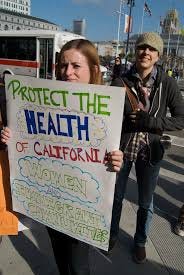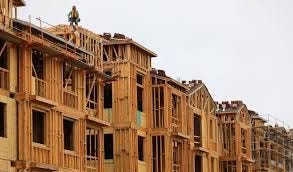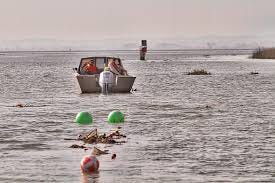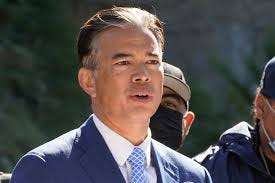Now that the election is over, we’re moving full-speed ahead with our second Independent California Poll. This time, we’re focusing on what California’s elected officials can do to protect Californians and win greater autonomy for California.
It costs $12 to poll one random Californian. Please donate what you can!
And a huge thank you to all the people who’ve donated so far!
Newsom, Trump to duke it out
Much more than abortion rights at risk
Now is the time to talk about California independence
Was this email forwarded to you? Become a free subscriber here.
THE US IS OUT OF STEP WITH CALIFORNIA
Look at these vote counts!
United States, excluding California (so far):
Kamala Harris . . . 64,529,093 (47.8%)
Donald Trump . . . 70,467,081 (52.2%)
California (so far):
Kamala Harris . . . 8,195,830 (58.8%)
Donald Trump . . . 5,316,729 (38.1%)
Note: California cast 10% of all votes in the US (so far), despite knowing that our votes mostly had no impact on the federal government.
We repeat: It’s time to talk about California independence
Some of us have been understandably shy about talking with our friends, family, and co-workers about California independence.
Now is the time to be brave and bring it up in conversation. Would California be better off as an independent question? Does California deserve more autonomy than other states? Is it okay that the federal government controls 45% of our land and about half the water we use?
Poll results show that most Californians already hold pro-independence views, but by and large, we don’t feel comfortable talking about it. It’s time for that to change.
Especially, right now, Californians are looking for answers on what to do in response to a second Trump administration. And you have part of the answer!
Please, please encourage anyone you know to subscribe to this newsletter and donate to our next poll. The next four years are going to be tremendously challenging for California, and we need to organize as many Californians as we can to fight back.
WHAT TRUMP WIN MEANS FOR CALIFORNIA
What Trump’s victory means for education in California
Will Trump’s tax cuts to the rich will be paid for by budget cuts in public education?
Diana Lambert, Zaidee Stavely, John Fensterwald, Karen D’Souza, Amy Dipierro, and Michael Burke, EdSource
“Trump, whose position on education has focused more on cultural ideology than on policies to improve education, has threatened to cut school funding to states, such as California, with policies that protect transgender students and promote diversity, equity and inclusion in their schools. He also has pledged to deport undocumented immigrants en masse, a move that would impact millions of California families and their children.
Newsom, who has been a high-profile adversary to Trump, foreshadowed the coming tensions between the president-elect and the nation’s largest and, by some measures, bluest state in a statement on X, or Twitter, on Oct. 18.
“Donald Trump just said he will take away $7.9 BILLION in school funding from California’s kids if we don’t do whatever he wants. This man is unhinged and unfit to be President,” wrote Newsom.
The $7.9 billion represents the total annual federal K-12 funding for California, about 7% of the total California spending on education in 2024-25, according to state Department of Finance figures.”
California versus Trump: One of the biggest battles could be over your car
Kurtis Alexander, SF Chronicle
“California’s nation-leading fight against climate change is threatened, once again, with the election of Donald Trump as president, perhaps most so by undercutting the state’s push for cleaner vehicles.
The Newsom administration has laid out an ambitious plan to phase out the sale of gas-powered cars by 2035 as well as continue trimming the planet-warming emissions of trucks, boats and trains. The transportation sector accounts for nearly half of the climate pollution spewed in California.
But Trump, who has called climate change a “hoax,” has pledged to squash the state’s vehicle regulations, just as he worked to do so during his first presidential term. The fate of the state’s transportation policies impacts not only California but the rest of the country, and even the world, as automakers, oil companies and other businesses seek to align their practices with the state to ensure access to its large, lucrative customer market.”
Food, fluoride and funding: How a new Trump term might affect health in California
Karen Kaplan, Corinne Purtill and Emily Alpert Reyes, LA Times
“Though Trump has publicly distanced himself from the conservative Project 2025 playbook, many of its proposals overlap with Trump’s agenda and the Republican Party platform. As such, analysts say its detailed proposals on opioid addiction, contraception, mental health treatment and more bear watching.”
Click here for more about the effect on on reproductive rights, vaccines, gender-affirming care, medicaid, nutrition, food safety, and the Affordable Care Act.
California empowered immigrants to speak up at work. Trump could end their protections
Jeanne Kuang, CalMatters
“In 30 years in America, Alejandro Gamez took any job he could as an undocumented worker — at fast food restaurants, factories and car washes and driving trucks, even when conditions were poor.
“I had no status,” he said. “I had no options.”
But after speaking up in 2017 about unpaid wages at an Inglewood car wash, his fortunes changed. As part of a state investigation into that employer’s labor practices, Gamez this year became eligible for four years of protection from deportation — and a temporary work permit that seemed to open doors overnight. The 51-year-old Hawthorne resident said he can apply for better, stable jobs that pay more and provide benefits. He now has a union-represented position in a college kitchen and a Social Security number to build his credit.
His opportunities are thanks to a recent federal program that grants temporary legal status to workers involved in certain labor investigations. With some of the nation’s strictest workplace laws but widespread concerns of employer retaliation, California has issued more than 200 requests to the U.S. Department of Homeland Security, asking it to grant legal status to workers who report violations.
But just months after Gamez got his reprieve, the program may be on the chopping block: President-elect Donald Trump and his advisors have vowed mass deportations, a return to workplace immigration raids and the repeal of similar temporary protection programs.”
We love to hear from readers like you! Please reply to this email with suggestions for the next issue.
How another Trump presidency could impact housing in California
Adhiti Bandlamudi, Erin Baldassari, Vanessa Rancaño, KQED
“While lawmakers in California have made significant strides in passing bills to encourage more housing development, many cities have upheld policies or enacted new ones to slow growth.
“The most likely outcome [of the Trump presidency] is slightly worse than the status quo,” Lewis said. “But even that won’t change if the cities won’t reduce their barriers to build more housing.”
When it comes to the cost of constructing housing, however, Trump’s promises to crack down on illegal immigration, if realized, could grind “the construction industry to a halt,” said Russell Lowery, executive director for the California Rental Housing Association. An estimated 23% of the construction industry nationally (PDF) is made up of undocumented immigrant workers, according to the Center for American Progress.
“That would have a negative impact on supply no matter what,” he said. “If you don’t have people who can build the product, you’re not going to increase supply.”
Tariffs could also make the cost of construction materials more expensive, Lowery said. Trump promised to impose blanket tariffs of 10% to 20% on all imports, which could raise the cost of imported construction supplies.”
Trump’s proposed tariffs, especially on China and Mexico, could hit California hard
Levi Sumagaysay, CalMatters
“Businesses that import goods into the country must pay the tariffs. They tend to pass on their increased costs to consumers, with some executives recently promising to do just that during their earnings calls. So economists largely view tariffs as a tax, especially on the lowest- and middle-income families in the nation.
“While tariffs could raise prices for all U.S. consumers, California could feel the brunt of the impact in part because of the countries Trump singled out during his campaign: China and Mexico. Those two countries accounted for 40% of the state’s imports in 2023.
“The port and logistics complex in Southern California is a very important part of the economy, and directly tied to the countries he threatened,” said Stephen Levy, an economist and director of the Center for Continuing Study of the California Economy, an independent, private research organization in Silicon Valley.“
The Trump-California water wars are about to begin
Kurtis Alexander, SF Chronicle
“In a social media post days after the election, President-elect Donald Trump made clear that California’s water wars are top of his agenda — and he’s firmly on the side of big water users, not fish.
His early words for the state come as little surprise after his first four years in office. The previous Trump administration successfully rolled back environmental protections to send more water from rivers in the north to farms and cities farther south.
While the agriculturally rich San Joaquin Valley welcomes water that might return with Trump 2.0, critics worry that the president’s prior term now gives him the know-how for an even bigger water grab, all the while drying up landscapes, killing wildlife and ruining the serenity and sport many residents seek on the state’s waterways.”
Here we go again: California prepares to battle Trump over environmental policies
Nigel Duara, Julie Cart, Alejandro Lazo, Alastair Bland and Alejandra Reyes-Velarde, CalMatters
“As much as California proclaims its exceptionalism, lauding its environmental policies as examples to the rest of the nation, the Golden State is just that, a state — not a nation state. It relies on the federal government for aid, funding and partnership on major initiatives.
California’s massive water projects, its authority to clean its air, federal support for offshore wind and disaster aid for wildfires all depend on cooperation with the new Trump administration.”
Click here to read more about Trump and wildfire disaster funds, the Delta water wars, California’s clean cars and trucks, and offshore wind projects.
Trump has promised to ‘end’ offshore wind. What will that mean for California’s big bet?
Julie Cart, CalMatters
“California’s offshore wind industry could be a casualty if President Elect Donald Trump makes good on his promise to sign an executive order to “end” the offshore wind industry.
He cannot do it with the stroke of a pen. But Trump can deeply wound the state’s next-generation renewable energy source by cutting off funding just as it’s gaining a foothold in the U.S.
California’s offshore wind plans rely on a federal policy that offers billions of dollars in grants, subsidies and tax incentives.
Floating offshore wind farms, which bob in the deep ocean as much as 20 miles from shore, are still not common in U.S. waters. But the technology is well on its way to being deployed in the ocean off California, which is counting on the clean energy source to meet its goals to scrub fossil fuels from the electric grid.”
PLAN B RESISTANCE GEARING UP; WILL IT WORK?
Opinion: For California, success is the best and only revenge against Trumpism
Opinion staff, SF Chronicle Editorial Board
“California is the fifth-largest economy in the world. Our purchasing power drives the consumer market. We are an agriculture hub; the nation depends on us for food. We remain the center of both the technological and creative universe. Our natural beauty is the envy of the country. We are one of the few places that has the resources, talent and intellectual capital to thrive in isolation.
All of this gives us leverage to shape the nation. But we need to use these inherent advantages to do more than lecture the majority of the country that they are wrong. We need to show them that we are right — something we have consistently failed to do in recent years.
Many necessary next steps are obvious, if unnecessarily controversial. In the face of federal inaction on climate, we can build dense, mixed-income housing near jobs, transit and amenities in our cities so that people don’t have to drive. Concentrating more of this development in temperate, job-rich coastal places like the Bay Area creates efficiencies within efficiencies. Fewer vehicle miles traveled means fewer emissions. Dense development uses less water, which leads to better preservation of our wild spaces. Moderate climates like San Francisco’s need less air conditioning and heat, easing the strain on the power grid and bringing down costs. Adding people to the city will create a larger tax base to fund expensive infrastructural improvements like water recycling and rainwater capture — so we can stop dumping our sewage in the bay.”
As with Trump’s last term, California will lead the liberal resistance
Kevin Rector and Angie Orellana Hernandez, LA Times
“In fact, as Trump’s return to power came into focus late Tuesday, California Atty. Gen. Rob Bonta said he already had a plan to do so — that the state was “1,000% focused” and ready to fight, in court and beyond, for California’s progressive way of life.
“We will use the full force of the law, the full authority of the office, to defend and protect California’s progress, our people, our values,” said Bonta, who is eyeing a run for governor.
“We’ve been spending months, in some cases over a year,” Bonta added, “planning on potential attacks and our responses to them across all the different issues and areas — from attacking our environment to attacking reproductive freedom, our common sense gun laws, our LGBTQ+ community, our civil rights, different constitutional rights.”
California sued the first Trump administration more than 100 times — often successfully — and Bonta said a similarly litigious approach was almost certain during the former president’s second term.”
Newsom calls special session to prepare California for legal fight against Trump
Guy Marzorati, KQED
“Newsom’s first two years in office were defined by frequent clashes with then-President Donald Trump over climate change, immigration and health care policy. Now, the governor is directing the Legislature to meet in early December to approve new funding as the state expects to take on the White House in court.
“California has faced this challenge before, and we know how to respond,” Newsom said in a statement. “We are prepared to fight in the courts, and we will do everything necessary to ensure Californians have the support and resources they need to thrive.”
“Resistance isn’t just suing the federal government,” said Manuel Pastor, a professor of sociology and American Studies & Ethnicity at the University of Southern California. “It’s also moving the needle on things people care about.”
Pastor, who chronicled the political lessons from recent California history in his book, State of Resistance, said the state’s experience during the first Trump term and Newsom’s own political ambitions will shape California’s response to the incoming administration.
“Newsom is both much more aware of [what a Trump presidency could be like] and actually also has a much different set of political incentives,” Pastor added.”
California schools chief pledges to resist cuts in funding if Trump axes U.S. Dept. of Education
Emma Gallegos, EdSource
“Thurmond said there are concerns that abolishing the department would put at risk some $8 billion that California receives in federal funds for programs serving students with disabilities and those attending low-income schools, both public and private.
“We will not allow that to happen,” he said. “The law will not allow that to happen.”
He observed, for example, that the Individuals with Disabilities Education Act, known as IDEA, guarantees students in special education programs a “free and appropriate education,” and to receive a range of special education services in an individualized education program drawn up for every special education student.
Thurmond said Trump’s plan to defund the Department of Education would also harm students whose civil rights are violated and investigated through the Office of Civil Rights, including victims of racism, antisemitism, Islamophobia, hate and bias toward LGBTQ students.”
Newsom heads to D.C. to lobby for California’s wish list before Trump takes over
Matt Hamilton, LA Times
Newsom is set to fly out Monday morning and, once at the Capitol, meet with members of California’s congressional delegation and key officials in the Biden administration.
At the top of his agenda: pushing the Environmental Protection Agency to give the green light on waivers so that the state’s more stringent vehicle emissions standards can take effect.
Eight clean-air rules are awaiting EPA approval, including a rule governing small off-road engines that would ban the sale of gas-powered yard equipment including leaf blowers, lawn mowers and other equipment, and a rule to eventually sunset diesel engines in trains and guarantee trains are zero-emission by 2058.
Newsom will also be pushing the Biden administration to sign off on efforts by California to use Medicaid funding to test new or expanded programs for those who are homeless or at risk of homelessness and have significant behavioral needs.”
California shores up its legal defenses anticipating another Trump presidency
Ruth Dusseault, Bay City News
“California has a constitutional amendment to protect reproductive rights, including abortion and contraception. According to Newsom’s statement, the state has also spent $45 billion on climate change programs, resulting in substantial progress like surpassing electricity demand with clean energy and bolstering battery storage capacity.
LGBTQ+ rights were solidified on Tuesday with the approval of Proposition 3, which removed language in the state Constitution that stated marriage is only between a man and woman. That language was from 2008’s Proposition 8, which voters approved but was eventually overturned in federal court.
In the governor’s statement, Senate President pro Tempore Mike McGuire, D-North Coast, added a warning.
“We learned a lot about former President Trump in his first term — he’s petty, vindictive, and will do what it takes to get his way no matter how dangerous the policy may be,” said McGuire. “California has come too far and accomplished too much to simply surrender and accept his dystopian vision for America. This is why we’re moving with speed and investing in our legal defense.”
“California will remain the steadfast beacon of hope and progress,” said Bonta. “It has always been a constant, unwavering, immovable force to be reckoned with, will continue to be a check on overreach and push back on abuse of power, be the antidote to dangerous extremist, hateful vitriol, be the blueprint of progress for the nation to look to. Remember, in moments of chaos in D.C., you can always look to California for calm resolve. It is often said as California goes, so goes the nation. In the days and months and years to come, all eyes will look west.’”
Gavin Newsom’s quest to ‘Trump-proof’ California enrages incoming president
Dustin Gardiner, Politico
“Governor Gavin Newscum is trying to KILL our Nation’s beautiful California,” Trump said Friday in a post on Truth Social, using his derisive nickname for the governor. “He is using the term ‘Trump-Proof’ as a way of stopping all of the GREAT things that can be done to ‘Make California Great Again.’”
Trump’s post came a day after Newsom said state lawmakers would convene to take immediate legislative action to counter Trump’s expected attacks on abortion, electric vehicles, immigration and federal disaster aid.”
Opinion: California would benefit from going Coastal
Let’s put the California Coastal Commission in charge of the entire state.
Joe Mathews, Zócalo Public Square
“What distinguishes the Coastal Commissions is its willingness to say no to the powerful.
The commission fought entertainment mogul (and campaign donor) David Geffen for decades as he sought to keep the public away from the beach outside his Malibu property. It had a long war with U2 guitarist The Edge, whose ambitions for a beachside compound threatened the coastal environment. Now the commission seeks to stop venture capitalist Vinod Khosla from turning coastal San Mateo County into his personal kingdom.
Why? Because, in this land of weak governments and cowardly corporations, the Coastal Commission is the rare California institution with a spine.
Elon Musk’s new fight against the commission is merely the latest testament to its extraordinary effectiveness.
The California Coastal Commission was created not by politicians but by the people of California, via a 1972 ballot initiative. Four years later, the Coastal Act established the commission as an independent and permanent agency with the power to review construction and other activities in the coastal zone, which extends from high tide to as much as five miles inland.
The commission fought entertainment mogul (and campaign donor) David Geffen for decades as he sought to keep the public away from the beach outside his Malibu property. It had a long war with U2 guitarist The Edge, whose ambitions for a beachside compound threatened the coastal environment. Now the commission seeks to stop venture capitalist Vinod Khosla from turning coastal San Mateo County into his personal kingdom.
So, it was inevitable that the commission would battle the world’s richest and most arrogant person, Elon Musk. On Oct. 10, commissioners voted to oppose an expansion of the number of SpaceX rocket launches from Vandenberg Space Force Base, on the Santa Barbara coast.
Musk quickly sued the commission, accusing it of political bias and exceeding its authority. In this, Musk was doubly wrong.
The commission was fulfilling its mission of protecting the coast. (Rocket launches are tough on the coastal wildlife). And it was responding to Musk’s decision to breach an agreement that limited it to six launches a year (Musk wants to launch 50 or more annually). SpaceX claims all the company’s launches are a military, national-security necessity and thus exempt from California scrutiny. That’s false. More than 80% of the launches don’t carry government payloads.”
BACK TO THE FUTURE
Fact Check: Gavin Newsom Is Not Trying to Secede California from Union
This article cites our poll: “A YouGov survey from February 2024 also found that a majority of Californians agreed they would be "better off" if it peacefully seceded from the union and had a "friendly relationship" with the United States.”
Tom Norton, Newsweek
“Following Trump's electoral victory, Newsom called for California lawmakers to convene a special session to safeguard the state's progressive policies ahead of the Republican's second term in the White House.
With Newsom's efforts making the news, rumors began circulating that he planned to take California out of the Union.
While the California governor may be making attempts to shield his state from Trump's legislative plans, the claim he wants to secede California from the union is unsubstantiated.
Claims otherwise appear to be editorial comment represented as fact without any sources or evidence.
Newsweek has contacted a media representative for Newsom via email for comment.
After Newsom's office told The Associated Press that the governor and lawmakers were ready to "Trump-proof" California's state laws, the president-elect called the Democrat "Newscum," accusing him on Truth Social of "using the term 'Trump-Proof' as a way of stopping all of the GREAT things that can be done to 'Make California Great Again.'“
There is no evidence that Newsom wants to secede California from the Union. There are no public statements or well-placed commentary confirming or suggesting this. While Newsom has referred to California as a "nation-state" before, he has criticized Republicans who have casually proposed secession elsewhere in the country.”
Opinion: California, it’s going to be OK. This is still our moment
It’s hard not to feel fatalistic about California’s future. But the past offers us some hope.
Shelby Grad, Deputy Managing Editor, LA Times
“Earthquakes. Wildfires. The palpable effects of climate change. Racial injustice. The very rich and the very poor coexisting uncomfortably. The booms and busts of an innovation economy. It’s the story of California — thrilling and a bit unstable at the same time. Back in the 1990s, the California-as-disaster-epic narrative was tinged with some gloating — a comeuppance for a star-making destination that for decades was America’s post-war wonderland. Now, the narrative feels more like a permanent state of mind as well as a culture war weapon.
It’s easy to see Kamala Harris’ defeat as one more loss for California, both because she is a product of the state and because so much of her political philosophy was formed here.
Optimism doesn’t solve problems. But what about the feeling that our problems are vast and insurmountable? Fallows sees the “declinist alarmism” about California as coming from the same mindset that argues America is a failing state (something people have been saying since the 1960s, despite much evidence to the contrary.)”
Opinion: The End of US democracy was all too predictable
Jason Stanley, Project Syndicate
“American politicians regularly appeal more subtly to racism and homophobia to win elections; it is, after all, a successful strategy. But the tacit agreement not to conduct such a politics explicitly – what the political theorist Tali Mendelberg calls the norm of equality – ruled out appealing too openly to racism. Instead, it had to be done through hidden messages, dog whistles, and stereotypes (such as by talking about “laziness and crime in the inner city”). But under conditions of deep inequality, this coded brand of politics eventually becomes less effective than the explicit kind. What Trump has done since 2016 is throw out the old tacit agreement, labeling immigrants as vermin and his political opponents as “the enemies within.” Such an explicit “us versus them” politics, as philosophers have always known, can be highly effective. Democratic political philosophy, then, has been correct in its analysis of the Trump phenomenon. Tragically, it also offers a clear prediction of what will come next. According to Plato, the kind of person who campaigns this way will rule as a tyrant.”




















